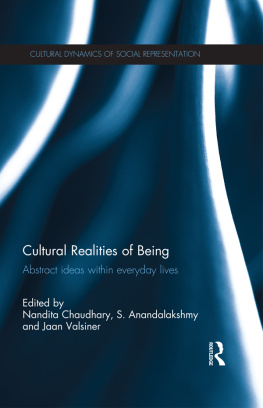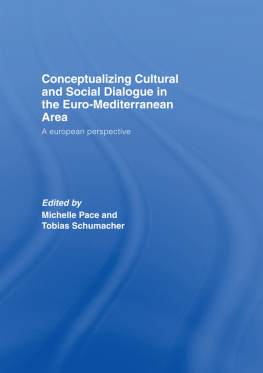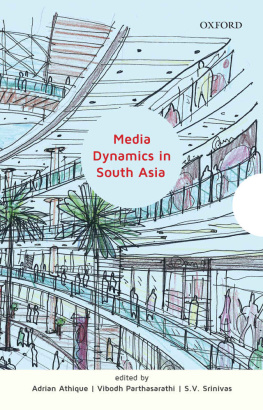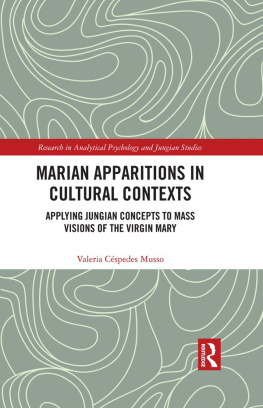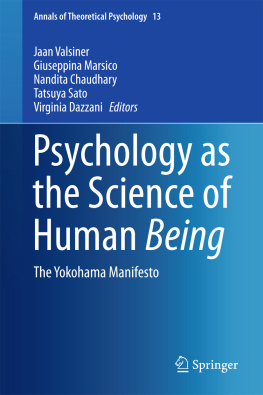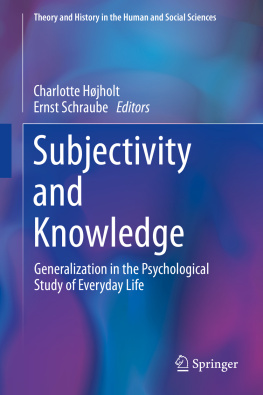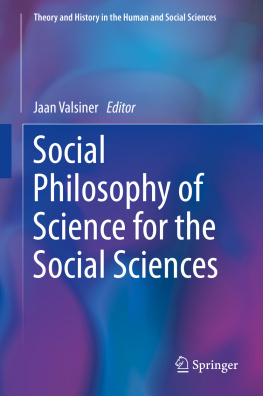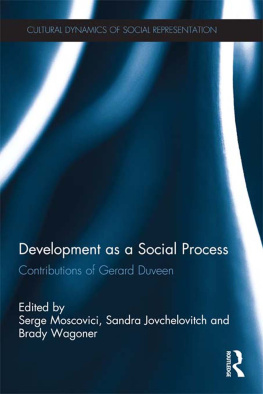Cultural Realities of Being
Cultural Realities of Being offers a dialogue between academic activity and everyday lives by providing an interface between several perspectives on human conduct. Very often, academic pursuits are arcane and obscure for ordinary people, this book will attempt to disentangle these dialogues, lifting everyday discourse and providing a forum for advancing discussion and dialogue.
Nandita Chaudhary, S. Anandalakshmy and Jaan Valsiner bring together contributors from the field of cultural psychology to consider how people living within social groups, regardless of how liberal, are guided by collective reality and interconnected with life circumstances. The book discusses experiences and events in the lives of people of Indian cultures covering topics including family, food, pilgrimages, social dynamics and truth, in order to expand the material on human phenomena under the broad frame of cultural psychology.
The book builds upon rich cultural traditions present in India, and precisely because of this focus, the book has much larger implications and relevance to the field and aims to orient the academic reader from around the world to viewing India and Indian society as a valuable area for research.
Divided into three parts, the book covers:
- social presentation in culture
- representing relations
- children and youth in culture.
This book includes commentaries from expert academics from outside India, providing a bridge between academic reality and cultural discourse and throwing fresh light on the everyday events presented in the text. Cultural Realities of Being will be essential reading for those studying Cross Cultural Psychology as well as those interested in social representation and identity.
Nandita Chaudhary is Associate Professor at Lady Irwin College, University of Delhi, India.
S. Anandalakshmy is a consultant in Chennai, India.
Jaan Valsiner is Niels Bohr Professor of Cultural Psychology at Aalborg University, Denmark, and Professor of Psychology and English at Clark University, USA.
The series Cultural Dynamics of Social Representation is dedicated to bringing the scholarly reader new ways of representing human lives in the contemporary social sciences. It is a part of a new direction cultural psychology that has emerged at the intersection of developmental, dynamic and social psychologies, anthropology, education and sociology. It aims to provide cuttingedge examinations of global social processes, which for every country are becoming increasingly multi-cultural; the world is becoming one global village, with the corresponding need to know how different parts of that village function. Therefore, social sciences need new ways of considering how to study human lives in their globalizing contexts. The focus of this series is the social representation of people, communities and last but not least the social sciences themselves.
In this series
Symbolic Transformation: The mind in Movement through Culture and Society
Edited by Brady Wagoner
Trust and Conflict: Representation, Culture and Dialogue
Edited by Ivana Markov and Alex Gillespie
Social Representations in the Social Arena
Edited by Annamaria Silvana de Rosa
Qualitative Mathematics for the Social Sciences: Mathematical Models for Research on Cultural Dynamics
Edited by Lee Rudolph
Development as a Social Process: Contributions of Gerard Duveen
Edited by Serge Moscovici, Sandra Jovchelovitch and Brady Wagoner
Cultural Realities of Being
Abstract ideas within everyday lives
Edited by Nandita Chaudhary,
S. Anandalakshmy and Jaan Valsiner

First published 2014
by Routledge
27 Church Road, Hove, East Sussex BN3 2FA
Simultaneously published in the USA and Canada
by Routledge
711 Third Avenue, New York, NY 10017
Routledge is an imprint of the Taylor & Francis Group, an informa business
2014 Nandita Chaudhary, S. Anandalakshmy and Jaan Valsiner
The right of the editors to be identified as the authors of the editorial material, and of the authors for their individual chapters, has been asserted in accordance with sections 77 and 78 of the Copyright, Designs and Patents Act 1988.
All rights reserved. No part of this book may be reprinted or reproduced or utilized in any form or by any electronic, mechanical or other means, now known or hereafter invented, including photocopying and recording, or in any information storage or retrieval system, without permission in writing from the publishers.
Trademark notice: Product or corporate names may be trademarks or registered trademarks, and are used only for identification and explanation without intent to infringe.
British Library Cataloguing in Publication Data
A catalogue record for this book is available from the British Library
Library of Congress Cataloging in Publication Data
A catalog record for this book has been requested
ISBN: 978-0-415-60063-7 (hbk)
ISBN: 978-1-315-88024-2 (ebk)
Contents
NANDITA CHAUDHARY AND S. ANANDALAKSHMY
S. ANANDALAKSHMY
DEVDUTT PATTANAIK
ALAN ROLAND
SHRADDHA KAPOOR
MILA TULI
NANDITA CHAUDHARY
ANA CECLIA BASTOS AND MIRI ALCNTARA
POOJA BHARGAVA
PUNYA PILLAI
SUJATA SRIRAM
MEIKE WATZLAWIK
JAAN VALSINER, NANDITA CHAUDHARY AND S. ANANDALAKSHMY
Figures
Tables
Miri Alcntara obtained her masters degree and her PhD in Public Health at the Federal University of Bahia, Brazil. She has been studying meaning-making processes related to family, conjugality and youth, specifically about delinquency from the perspective of youths themselves and of social, familiar and legal actors related to them.
Pooja Bhargava (Tata Institute of Social Sciences, Mumbai, India) is Child Development Consultant and Visiting Faculty at Tata Institute of Social Sciences, Mumbai, India.
Ana Ceclia Bastos (Federal University of Bahia, Salvador, Brazil) is Cultural Psychologist, Professor at the Catholic University of Salvador and Federal University of Bahia, Brazil.
Shraddha Kapoor (Lady Irwin College, University of Delhi, India) is Associate Professor at the Department of Human Development and Childhood Studies at Lady Irwin College, University of Delhi, New Delhi, India.
Devdutt Pattanaik is a physician turned leadership consultant, mythologist and author whose works focuses largely on the areas of myth, mythology and management, Mumbai, India.
Punya Pillai (Lady Irwin College, University of Delhi, India) is Assistant Professor at the Department of Human Development and Childhood Studies at Lady Irwin College, University of Delhi, New Delhi, India.
Alan Roland is a psychoanalyst in New York, who has written three books and numerous articles on the interface between psychoanalysis and Asian persons and cultures. He is currently a member of the Faculty and Board of Directors of the National Psychological Association for Psychoanalysis.
Sujata Sriram (Tata Institute of Social Sciences, Mumbai, India) is Associate Professor, Centre for Human Ecology, Tata Institute of Social Sciences, Mumbai, India.
Mila Tuli (Institute of Home Economics, University of Delhi, India) is Associate Professor at the Department of Human Development and Childhood Studies at Institute of Home Economics, University of Delhi, New Delhi, India.
Next page
